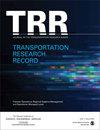Does Crowdshipping of Parcels Generate New Passenger Trips? Evidence from the Netherlands
IF 1.8
4区 工程技术
Q3 ENGINEERING, CIVIL
引用次数: 0
Abstract
Crowdsourced shipping or crowdshipping is a promising solution to sustainable parcel delivery, owing to the potential to consolidate freight trips with preexisting passenger trips. Previous literature focuses on these consolidation benefits but does not address the possibility of new activity generation in crowdshipping. In this study, we investigate the willingness of private persons to accept shipments based on a newly generated home-based trip. We compare this to the choices of occasional carriers who build on the daily home–work commute to deliver parcels. Two stated preference experiments are conducted and a multinomial logit choice model and a latent class choice model are employed. These allow us to provide values of time of the occasional carriers, as an original contribution to the literature. The results show that commute-based carrier values of time are higher than those of home-based carriers. Concerning the trip generating power of crowdshipping, we find that low-income groups have a relatively high propensity to generate a home-based pickup and delivery trip. Finally, parcel lockers as delivery points positively influence acceptance of crowdshipping requests, as they allow for more flexibility in delivery times. Together, these results support the notion that crowdshipping can act as a potential trip generator in households.包裹众包会带来新的旅客出行吗?来自荷兰的证据
众包运输或众包运输是可持续包裹递送的一个很有前途的解决方案,因为它有可能将货运旅行与现有的客运旅行合并在一起。以前的文献关注这些整合的好处,但没有解决在众筹中产生新活动的可能性。在这项研究中,我们调查了个人接受基于新产生的家庭旅行的发货意愿。我们将其与偶尔选择的快递公司进行比较,这些快递公司利用每天从家到公司的通勤时间来投递包裹。采用多项逻辑选择模型和潜在类别选择模型进行了两个陈述偏好实验。这些允许我们偶尔提供时间价值的载体,作为对文献的原创性贡献。结果表明,通勤型承运人的时间值高于居家型承运人。关于众包出行的生成能力,我们发现低收入群体产生居家取外卖出行的倾向相对较高。最后,包裹储物柜作为交付点对接受众筹请求有积极影响,因为它们允许更灵活的交付时间。综上所述,这些结果支持了这样一种观点,即众包可以成为家庭出行的潜在动力。
本文章由计算机程序翻译,如有差异,请以英文原文为准。
求助全文
约1分钟内获得全文
求助全文
来源期刊

Transportation Research Record
工程技术-工程:土木
CiteScore
3.20
自引率
11.80%
发文量
918
审稿时长
4.2 months
期刊介绍:
Transportation Research Record: Journal of the Transportation Research Board is one of the most cited and prolific transportation journals in the world, offering unparalleled depth and breadth in the coverage of transportation-related topics. The TRR publishes approximately 70 issues annually of outstanding, peer-reviewed papers presenting research findings in policy, planning, administration, economics and financing, operations, construction, design, maintenance, safety, and more, for all modes of transportation. This site provides electronic access to a full compilation of papers since the 1996 series.
 求助内容:
求助内容: 应助结果提醒方式:
应助结果提醒方式:


